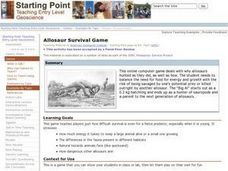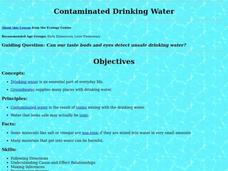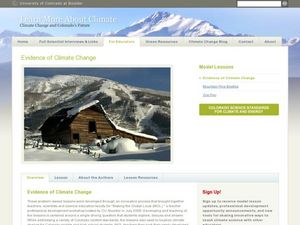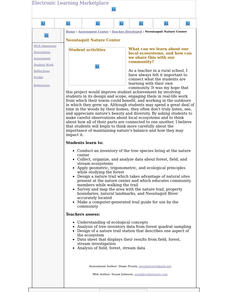Curated OER
Population Dynamics
Middle schoolers discover how organisms are dependent on one another for survivial. They also discuss how to conserve natural resources. They compare and contrast the different types of symbiotic relationships as well.
Curated OER
Ecosystems: A Home By Any Other Name
Students can learn more about the parts of ecosystems through exploration and hands on activities.
Curated OER
Underwater Hide and Seek
Students explain why color patterns that are easy to see above water may be difficult to detect under water and experience the problems predators face when searching for camouflaged prey.
Curated OER
Plants and Animals
Seventh graders discover the interconnectedness of plants and animals in ecosystems. In groups, they create a food web and discuss the problems when one link of the chain is broken. To end the lesson, they set up a balanced environment...
Curated OER
Appearances Are Deceiving
Young scientists study creeks around their area to see how clean the water really is. One way to tell is by the invertebrate populations that are present. This lesson introduces a game which learners simulate a variety of species found...
University of Wisconsin
Conjunction Function
As part of a unit, this lesson plan familiarizes youngsters with components of a rain garden. They speculate about the role of an assigned component in contributing to a rain garden, and ultimately, in the health of the local watershed....
Serendip
Food Webs, Energy Flow, Carbon Cycle, and Trophic Pyramids
The reintroduction of a species to an area doesn't always go as expected. Scholars learn about the reintroduction of wolves into Yellowstone National Park with a video, reading, and discussion questions. They complete a hands-on activity...
Serendip
Evolution of Fur Color in Mice – Mutation, Environment and Natural Selection
Most species of animals include a variety of fur or hair color, but why? Scholars watch a video about a changing environment for mice. As the rocks around them change hues, different colors of mice begin to thrive. Discussion questions...
Curated OER
Designer Seeds
Learners enjoy the challenge of the seed structure design component of this activity and become very competitive as they seek to create a seed that travel farthest.
Michigan Sea Grant
Wetlands
Wetlands may not sound particularly ornate, but they are as important as any habitat! With a hands-on activity, young scientists build a wetland model and observe its many functions in action. They discover the importance of wetlands to...
Curated OER
Flambe Elements
Eighth graders discuss atoms and electrons as well as atoic structure. They view atomic structure via the computer. Students watch a demonstration in which the teacher demonstrates glass tubing turning yellow in a Bunsen Burner flame....
Curated OER
The Energy Debate - Global Warming
Students describe what global warming is, what causes global warming and the impact to our world. They study the threat of global warming and its relationship to the use of fossil fuels.
Curated OER
Mystery Creek
Fourth graders are introduced to the Riparian Ecosystem. They define the following terms: riparian and riparian ecosystem. Students take a trip to the creek, where they make observations about the environment around them. They are...
Curated OER
Allosaur Survival Game
High schoolers uses this game to see how difficult survival is even for a fierce predator, especially when it is young. It stresses: How much energy it takes to keep a large animal alive or a small one growing, The differences in the...
Curated OER
Contaminated Drinking Water
Young scholars explore water and determine whether or not it is safe to drink. In this water exploration lesson, students are split into groups, to acts as the polluter, taster, and recorder. Young scholars explore by placing different...
Curated OER
Evidence of Climate Change
Sixth graders examine climate change in the state of Colorado. In this climate lesson, 6th graders watch 2 video clips regarding the topic and research the subtopics- snow pack, precipitation, temperature, forest fires, river flow,...
Curated OER
Zoo Poo
Students use Internet research to determine the amount of carbon dioxide produced per unit energy for biomass and coal. In this alternative energy lesson, students research to find out how much energy and carbon dioxide several coal and...
Curated OER
Neotaquit Nature Center: Ecosystems, Science, Technology
Students survey their local forest conducting an inventory of tree species and analyzing data of local ecosystems. They design a nature trail, map the area and make a computer generated trail guide.
Curated OER
The Rainforest Community
Students create a miniature rainforest ecosystem, a terrarium. Students then explain how the continuous flow of energy and food in the ecosystem allows it to sustain itself.
Curated OER
Animals and the Food Webs that Love Them
Young scholars study the animals that Lewis and Clark would have encountered. In this animals lesson students study the food web and how human populations have affected them.
Curated OER
Into the Sea
Students display an awareness of the diversity of species in the coral reef, their habitat and adaptations. They conduct research to find and then color code the locations of coral reefs around the world.
Curated OER
Contaminated Drinking Water
Young scholars see if they can tell if our water is safe to drink by looking at it and tasting it. They perform an experiment using salt and vinegar to see when they can tell water has been contaminated.
Curated OER
Nutrition and Energy Flow
In this energy flow learning exercise, students will complete 10 short answer questions based on a food web diagram. Then students will review different cycles in nature including the water cycle, carbon cycle, and energy cycle. This...
Curated OER
Contaminated Drinking Water
Students investigate drinking water. In this water lesson plan, students discover if the water we drink is safe by participating in an experiment. Students use water and vinegar to observe how drinking water can be contaminated.
Other popular searches
- Ecology Principles Biotic
- Ecology Principles Abiotic
- Ecology Principles Quadrants
- Principles of Ecology

























